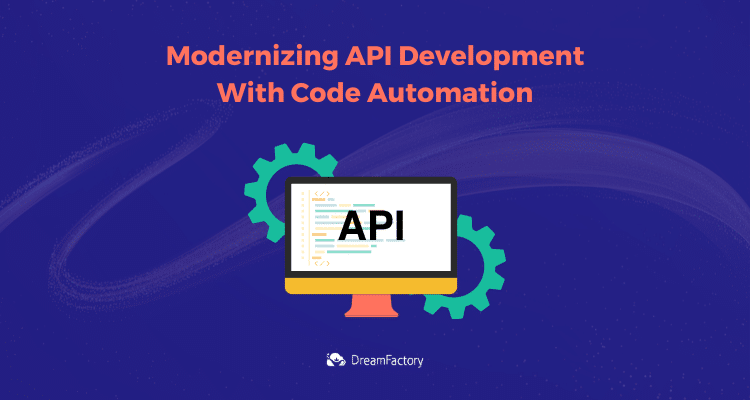APIs have revolutionized how businesses interact with their customers and partners. By providing a simple, standardized interface, APIs allow companies to expose their functionality as services that anyone can access. However, managing and maintaining APIs can be a time-consuming and expensive process. Automating the code generation and testing processes can help reduce costs while improving quality and consistency.
Understanding how code automation and application modernization can help you streamline your code development process is essential for your long-term success as a software engineer.
The key things to know about API development with code automation:
- Automating code generation and testing processes can reduce costs and improve quality in API management.
- APIs allow businesses to open up data and functionality to third-party developers, monetize services, and save time and money by leveraging existing features.
- Integrating multiple APIs can create more efficient workflows by sharing data and functionality across applications.
- Challenges in API management include security, stability, scalability, and proper documentation.
- Code automation streamlines software development by reducing manual labor, improving consistency, and enabling faster access to new libraries and frameworks.
- Benefits of code automation include increased productivity, reduced errors, improved collaboration, and ease of use.
Table of Contents
What is Code Automation?
In the fast-paced world of software development, efficiency and productivity are crucial. One emerging technology that has been gaining traction is code automation. But what exactly is code automation, and why is it becoming increasingly important?
Code automation refers to the process of automating various aspects of software development, including code creation, maintenance, and testing. It involves leveraging tools and technologies to streamline repetitive and time-consuming tasks, allowing developers to focus on more complex and creative aspects of their work.
The benefits of code automation are numerous. First and foremost, it significantly reduces the time and effort required to develop software applications. By automating code generation, developers can produce large volumes of code quickly and efficiently. This not only speeds up the development process but also reduces the likelihood of human errors and typos.
Code automation also promotes consistency and standardization. Automated tools follow predefined templates and best practices, ensuring that the generated code adheres to established coding conventions. This consistency not only enhances the overall quality of the codebase but also makes it easier for multiple developers to collaborate on a project seamlessly.
Another advantage of code automation is its ability to handle complex features and functionalities. With automation tools, developers can easily integrate security protocols, data validation mechanisms, and other advanced functionalities into their applications. These features can be implemented rapidly without the need for extensive manual coding, saving valuable time and resources.
Code automation enables efficient and reliable testing. Automated testing tools can quickly run tests on the codebase, identifying and flagging any bugs or issues before the application is deployed. This helps developers catch and resolve potential problems early in the development cycle, leading to higher-quality and more robust software.
The Importance of APIs in Business
APIs are an essential part of modern software development. By providing a standardized interface between different services, APIs allow companies to integrate quickly with third-party systems and expose their functionality to customers.
Here are some key reasons why you must understand APIs and the most efficient ways to work with them:
- APIs allow businesses to open up their data and functionality to third-party developers: When working on a development project, it is increasingly common to have multiple parties work on the software. APIs provide a reliable, secure way for third-party developers to access parts of the code without needing full access. This is common with large-scale apps.
- Leverage APIs for additional revenue: Many companies offer paid access to their API, which can be a great way to monetize a popular service or application.
- APIs can help businesses save time and money by avoiding the need to develop specific features themselves: Leveraging features already built by another company can allow you to focus on developing the unique features of your application. This can be a huge time-saver and a cost-effective way to add features to an application.
- APIs can help create more efficient workflows by allowing different applications to share data and functionality: Integrating multiple APIs can help your business form more robust microservices. For example, the Slack API allows developers to integrate Slack with various other applications, such as Dropbox, Google Drive, and GitHub. This API integration can streamline workflows by eliminating the need to switch between different applications constantly.
The Challenges of Managing APIs
API management is a complex process that involves many different moving parts. At its core, API management is all about creating and maintaining a stable, secure, and Scalable API ecosystem.
There are a few key challenges that must be addressed when managing APIs:
- Security: APIs are often the target of attack because they expose valuable data and functionality to the outside world.
- Stability: APIs need to be able to handle large amounts of traffic without experiencing any downtime.
- Scalability: As your API grows in popularity, you will need to be able to scale it accordingly to meet the demand of your users.
- Documentation: Proper documentation is essential for any API, as it allows developers to understand how to use your API and integrate it into their applications.
How Code Automation Can Help Your API Development Process
Code automation is the process of automating code creation, maintenance, and testing. This can include writing code that automatically generates other code from pre-defined templates or models and automating debugging and testing processes. Code automation helps streamline software development by reducing the manual labor involved in coding, reducing costs, and increasing efficiency.
By using code automation, developers can quickly create software applications with fewer lines of code, reducing development time and cost. Automated tools provide a more consistent output than manual coding, mainly when used across multiple projects and platforms. Additionally, automated tools reduce errors due to human mistakes such as typos or syntax errors.
Code automation also allows developers to quickly add complex features such as security protocols and data validation into their applications without manually writing all the code each time they need it.
Automation tools provide faster access to new libraries and frameworks that can be used in subsequent development cycles. Furthermore, automated testing tools allow developers to quickly test their applications for bugs before releasing them into production environments.
Overall, code automation enables developers to create high-quality software faster and more efficiently than traditional manual coding methods. Simplifying tedious tasks and use cases like debugging and testing allows developers to focus on solving harder problems, leading to better application performance and higher customer satisfaction.
In addition, when it comes to legacy modernization, developers can remove monolithic or legacy applications without worry since the application development time to build new and updated software to replace them is now reduced.
The top benefits of code automation include:
- Increased Productivity: Code automation can drastically reduce the time and workload required to complete a project or task. Automating repetitive tasks such as creating databases, setting up servers, or writing code for web applications can save developers from hours of tedious work.
- Reduced Errors: By utilizing process automation, developers can avoid errors that come with manual coding and debugging. Automated testing tools also help ensure that any changes made in real time do not create unexpected issues in other application areas.
- Improved Collaboration: By allowing different teams to automate their parts of the development process, projects become easier to manage and coordinate between multiple people or groups working on them simultaneously. This kind of collaboration makes it possible to produce better results more quickly while maintaining quality control throughout the process.
- Ease of Use: Automation tools are generally easier to use and understand than manual coding. With the proper training, developers can quickly become comfortable using these automated tools to take advantage of their features and benefits.
The Future of APIs & Why Code Automation Will Be Essential
As we move into the future, digital transformations and APIs will only become more prevalent and essential. With the rise of the Internet of Things and modernization, more devices than ever need to communicate with each other, and APIs are the key to making that happen. In addition, as we move towards a more data-driven society, APIs will play an increasingly important role in giving us access to the data we need to make informed decisions.
So, it's clear that APIs are here to stay. This means that developers need to be prepared for the future of API development, and code automation is one of the best ways to do this. Code automation will benefit you whether your business is a cloud-based SaaS or focuses on backend web services. Here are a few reasons why code automation will play an essential role in the future of API development:
- Increased Standardization: One trend likely to continue is the increased standardization of APIs. As more and more companies rely on APIs to Power their businesses, there is a growing need for standards that everyone can adhere to. With code automation, developers can quickly and easily create APIs that follow these industry standards regardless of the language or framework they are using.
- Easier Access to Complex Features: In the future, APIs will need to become more feature-rich to meet customer demands. Code automation makes it easy for developers to optimize or quickly add complex features like authentication, data validation, data integration, and security protocols into their business applications without having to write all of this code from scratch every time.
- Greater Security: As API usage increases, so does the need for better security around them. We are likely to see more efforts to secure API communications, both at the transport level and at the application level. Automated code can help businesses and teams of all skill levels (expert to no-code experience) stay ahead of the curve and quickly implement security protocols without having to write secure code manually each time.
- Increased Focus on Developer Experience: Finally, we will likely see a greater focus on developer experience regarding APIs. Companies are starting to realize that if they want their APIs to be successful, they need to make them easy for developers to use. This means providing comprehensive documentation, well-structured API endpoints, and intuitive low-code tools for developing with their APIs. Code automation helps make this process faster and easier by taking care of the mundane tasks that can slow developers down.
Conclusion
APIs are becoming increasingly important, and the future of APIs looks bright. We can expect to see an increasing focus on standardization, open APIs, security, intelligent API management tools, and improved developer experience. These trends will help to further increase the adoption of APIs in all areas of our lives, from business to entertainment. With the right approach and understanding, companies can fully utilize this technology and unlock robust new business processes.
If your business is looking for a simple API management solution to help you keep up with the ever-changing landscape of API development, DreamFactory's platform may be the perfect fit. Our intuitive low-code UI makes it easy to rapidly develop, deploy, and manage APIs in a secure environment.
Start a free 14-day trial today and see why DreamFactory could be the ideal solution for your API needs.
Related Reading:
https://blog.dreamfactory.com/a-complete-guide-to-api-generation/
Frequently Asked Questions: Modernizing API Development With Code Automation
What is code automation?
Code automation refers to the process of automating various aspects of software development, such as code creation, maintenance, and testing. It involves using tools and technologies to streamline repetitive tasks and enhance productivity. Code automation is important because it significantly reduces development time, ensures code consistency, handles complex features easily, and facilitates efficient testing. Embracing code automation allows developers to focus on more critical aspects of their work and deliver high-quality software efficiently.
What are the challenges in managing APIs?
Managing APIs involves addressing challenges such as security, stability, scalability, and documentation. APIs are often targeted by attackers, so security measures are crucial. APIs must be able to handle large amounts of traffic without experiencing downtime, and they need to scale according to user demand. Proper documentation is essential for developers to understand and integrate APIs effectively.
How can code automation help in API development?
Code automation involves automating code creation, maintenance, and testing processes. It reduces manual labor, saves time, and improves efficiency. With code automation, developers can quickly create software applications with fewer lines of code, ensure consistent output, add complex features easily, access new libraries and frameworks faster, and test applications for bugs before release.
What are the benefits of code automation?
Code automation offers increased productivity by reducing workload, reduced errors compared to manual coding, improved collaboration among teams, and ease of use. It simplifies tedious tasks, enables faster project completion, and enhances overall application quality and customer satisfaction.
Why will code automation be essential in the future of API development?
As APIs become more prevalent and essential in digital transformations, code automation will play a crucial role. It allows for increased standardization, easier access to complex features, greater security, and improved developer experience. Code automation enables developers to adhere to industry standards, optimize APIs, implement security protocols easily, and create APIs that are easy to use for other developers.
What can we expect in the future of API development?
The future of API development will likely involve increased standardization, more feature-rich APIs, improved security measures, and a greater focus on developer experience. The adoption of APIs is expected to increase across various industries, and businesses will invest in intelligent API management tools and technologies to enhance their processes.
What is DreamFactory?
DreamFactory offers an intuitive low-code platform for API management. It allows businesses to rapidly develop, deploy, and manage APIs in a secure environment. DreamFactory's platform simplifies the API development process, making it easier for businesses to keep up with the evolving landscape of API development.
Terence Bennett, CEO of DreamFactory, has a wealth of experience in government IT systems and Google Cloud. His impressive background includes being a former U.S. Navy Intelligence Officer and a former member of Google's Red Team. Prior to becoming CEO, he served as COO at DreamFactory Software.
























 Blog
Blog
